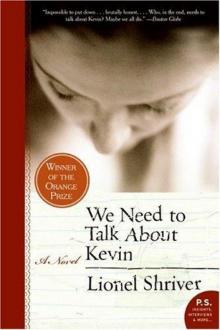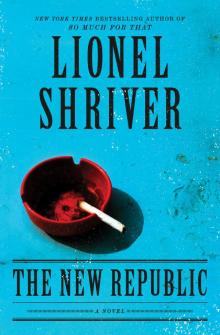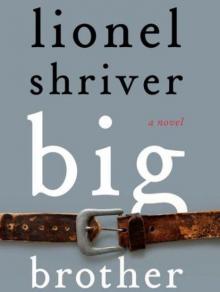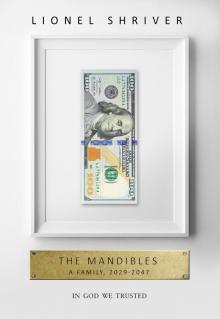- Home
- Lionel Shriver
So Much for That: A Novel
So Much for That: A Novel Read online
L I O N E L S H R I V E R
So Much for That
To Paul. In loss, liberation.
Table of Contents
Chapter One
Chapter Two
Chapter Three
Chapter Four
Chapter Five
Chapter Six
Chapter Seven
Chapter Eight
Chapter Nine
Chapter Ten
Chapter Eleven
Chapter Twelve
Chapter Thirteen
Chapter Fourteen
Chapter Fifteen
Chapter Sixteen
Chapter Seventeen
Chapter Eighteen
Chapter Nineteen
Acknowledgments
About the Author
ALSO BY LIONEL SHRIVER
Copyright
About the Publisher
Time is money.
—BENJAMIN FRANKLIN,
Advice to a Young Tradesman, 1748
Chapter One
Shepherd Armstrong Knacker
Merrill Lynch Account Number 934-23F917
December 01, 2004 – December 31, 2004
Net Portfolio Value: $731,778.56
What do you pack for the rest of your life? On research trips—he and Glynis had never called them “vacations”—Shep had always packed too much, covering for every contingency: rain gear, a sweater on the off chance that the weather in Puerto Escondido was unseasonably cold. In the face of infinite contingencies, his impulse was to take nothing.
There was no rational reason to be creeping these halls stealthily like a thief come to burgle his own home—padding heel to toe on the floorboards, flinching when they creaked. He had double-checked that Glynis was out through early evening (for an “appointment;” it bothered him that she did not say with whom or where). Calling on a weak pretense of asking about dinner plans when their son hadn’t eaten a proper meal with his parents for the last year, he had confirmed that Zach was safely installed at a friend’s overnight. Shep was alone in the house. He needn’t keep jumping when the heat came on. He needn’t reach tremulously into the top dresser drawer for his boxers as if any time now his wrist would be seized and he’d be read the Miranda.
Except that Shep was a burglar, after a fashion. Perhaps the sort that any American household most feared. He had arrived home from work a little earlier than usual in order to steal himself.
The swag bag of his large black Samsonite was unzipped on the bed, lying agape as it had for less drastic departures year after year. So far it contained: one comb.
He forced himself through the paces of collecting a travel shampoo, his shaving kit, even if he was doubtful that in The Afterlife he would continue to shave. But the electric toothbrush presented a quandary. The island had electricity, surely it did, but he’d neglected to discover whether their plugs were flat American two-prongs, bulky British three-prongs, or the slender European kind, wide-set and round. He wasn’t dead sure either whether the local current was 220 or 110. Sloppy; these were just the sorts of practical details that on earlier research forays they’d been rigorous about jotting down. But then, they’d lately grown less systematic, especially Glynis, who’d sometimes slipped on more recent journeys abroad and used the word vacation. A tell, and there had been several.
Resistant at first to the Oral B’s jarring cranial buzz, at length Shep had come to relish the slick of his teeth once the tedium was complete. As with all technological advances, it felt unnatural to go backward, to resume the fitful scrub of splayed nylon on a plastic stick. But what if Glynis went to the bathroom when she came home and noticed that his blue-ringed toothbrush was missing, while hers, with the red ring, still sat on the sink? Best she didn’t begin this of all evenings with perplexity or suspicion. He could always take Zach’s—he’d never heard the kid use it—but Shep couldn’t see swiping his own son’s toothbrush. (Shep had paid for the thing, of course, along with pretty much everything here. Yet little or nothing in this house felt like his. That used to bug him but now just made it easier to leave the salad spinner, the StairMaster, and the sofas behind.) Worse, he and Glynis shared the same recharger. He didn’t want to leave her with a toothbrush that would last five or six days (he didn’t want to leave her at all, but that was another matter), its weakening, terminal shudder providing a soundtrack for his wife’s lapse into another of her periodic depressions.
So having unscrewed the wall mount only a turn or two, he tightened it back down. Restoring his own handle reassuringly to the recharger, he scrounged a manual brush from the medicine cabinet. He would have to grow accustomed to technological regression, which in a manner he couldn’t quite put his finger on was surely good for the soul. Something about backtracking to a stage of development that you could understand.
He wasn’t planning simply to cut and run, to disappear himself from his family absent announcement or explanation. That would be cruel, or crueler. He wasn’t presenting her with a total fait accompli either, a wave goodbye at the door. Officially he would confront her with a choice, one for which, in the service of credibility, he had paid through the nose. Odds were that he had purchased nothing but an illusion, but an illusion could be priceless. So he’d bought not one ticket, but three. They were nonrefundable. If his instincts were all out of whack and Glynis surprised him, Zach still wouldn’t like it. But the boy was fifteen years old, and how was this for developmental regression: for once an American teenager would do what he was told.
Anxious about being caught in the act, in the end he had too much time. Glynis wouldn’t be home for another couple of hours, and the Samsonite was replete. Given the confusion over plugs and current, he’d thrown in a few manual hand tools and a Swiss Army knife; in the average crisis, you were still better off with a pair of needle-nose Vise-Grips than a BlackBerry. Only a couple of shirts, because he wanted to wear different shirts. Or no shirt. A few bits and pieces that a man with Shep’s occupation knew could make the difference between satisfied self-sufficiency and disaster: duct tape; a selection of screws, bolts, and washers; silicon lubricant; plastic sealant; rubber bands (elastics, for N’ Hampshire old-timers like his father); and a small roll of binding wire. A flashlight, for power cuts, and a stock of AAs. A novel he should have selected more carefully if he was taking only one. An English—Swahili phrasebook, malaria pills, deet. Prescription cortisone cream for persistent eczema on his ankle, a tube that would soon run out.
Obviating any further inclusions, his Merrill Lynch checkbook. He didn’t like to think of himself as calculating, but it turned out to be fortunate that he’d always kept this account in his name alone. He could—he would, of course, offer to leave her half; she hadn’t earned a dime of it, but they were married, and that was the law. Yet he would have to warn her that even hundreds of thousands of dollars wouldn’t last her long in Westchester, and sooner or later she’d have to do not “her work” but someone else’s.
He’d had to stuff the Samsonite with newspaper to keep the paltry chattel from rattling in the British Airways hold. He stashed it in his closet, covering it with a bathrobe for good measure. A packed bag on the bedspread would alarm Glynis far more than a missing toothbrush.
Shep settled in the living room with a bourbon bracer. It wasn’t his habit to begin an evening with anything stronger than beer, but habit would have delayed this evening indefinitely. He put his feet up, casting his eyes around the pleasant but cheaply furnished room, unable to mourn leaving behind any aspect of the familiar surround, save the fountain. As for parting with the throw pillows or the nondescript glass coffee table on which it trickled, he felt positively cheerful. By contrast, the fountain had always filled him with t
hat distinctive middle-class covetousness, desire for what you already own. He wondered whimsically if, wrapped in the wadded newspaper that padded his scant booty, it would fit in the Samsonite.
They still referred to it as “the Wedding Fountain.” The sterling silver apparatus had substituted for a floral centerpiece at their modest gathering of friends twenty-six years before, twining the bride and groom’s labors, talents, and very natures. To this day, the Wedding Fountain constituted the only project on which he and Glynis had collaborated fifty-fifty. Shep had taken responsibility for the technical aspects of the gizmo. The pump was carefully hidden by a sweep of mirror-finish metal around the basin; since the mechanism ran continually, over the years he’d replaced it several times. Wise in the ways of water, he’d advised on the width and depth of sluices, the length of drops from one level to the next. Glynis had dictated the flow of the metal itself, its artistic line, forging and soldering the parts in her old studio in Brooklyn.
For Shep’s tastes, the fountain was austere; for Glynis’s, ornate; so that even stylistically the construction embodied a meeting of minds halfway. And it was romantic. Melded together at the top, two undulating silver sluices split and intermingled like swans’ necks, one supporting while the other broke to spill its liquid into the waiting pan of its mate. Narrow at their apex, the two central lines of their creation splayed and swooped in wider, ever more playful variations toward the basin. There the contributions of the fountain’s two tributaries formed a shallow indoor lake, thus pooling their resources in the most literal sense. Glynis’s workmanship was top-drawer. However busy, Shep had always honored her virtuosity by keeping the water topped up, and by periodically draining the contraption to polish the silver. Absent his conservation, the sterling’s accelerating yellow taint might suggest a tarnish on more than metal. Once he was gone, chances were that she’d turn the thing off, and shove it out of sight.
As allegory, the two streams feeding a common pool represented an ideal they had failed. Nevertheless, the fountain successfully integrated their elements. Glynis not only worked with metal (or used to); she was metal. Stiff, uncooperative, and inflexible. Hard, refractive, and shiny with defiance. Her body long, attenuated, and angular like the jewelry and flatware she once crafted, in art school Glynis had not chosen her medium by accident. She naturally identified with any material that so fiercely refused to do what you wanted it to, whose form was resistant to change and responded only to violent manhandling. Metal was obstreperous. Were it ever mistreated, its dents and scratches caught the light like kept grudges.
Like it or not, Shep’s element was water. Adaptive, easily manipulated, and prone to taking the path of least resistance, he went with the flow, as they said in his youth. Water was yielding, biddable, and readily trapped. He wasn’t proud of these qualities; pliancy didn’t seem manly. On the other hand, the apparent passivity of liquid was misleading. Water was resourceful. As any homeowner with an aging roof or corroded plumbing knew well, water was insidious, and in its own quiet way would find its route. Water had a devious willfulness of its own, a sneaky, seeping insistence, an instinct for finding the single seam or joint you’ve left unsealed. Sooner or later, water will get in if it wants to, or—more vitally, in Shep’s case—it will get out.
His first boyhood fountains, knocked together with inappropriate materials like wood, leaked badly, and his frugal father had chastised him for these “bubblers,” as Dad called them, that wasted water. But Shep became more ingenious with found objects: chipped serving bowls, the limbs of his sister’s discarded dolls; later creations lost water only to evaporation. The whimsies grew kinetic, using paddle wheels, cups that would fill and flop, jets that kept a suspended object bobbing at bay, sprays that tinkled chimes of seashells or shards of stained glass. He’d kept up the hobby to this day. As a counterweight to the relentless functionality of his vocation, fountains were fabulously frivolous.
This offbeat pastime almost certainly hailed not from some highfalutin metaphor for his character, but from the commonplace associations of childhood. Every July, the Knackers had rented a cabin in the White Mountains, beside which ran a wide, rushing stream. Back then, kids were privileged with real summers, expanses of unscheduled time receding to the hazy horizon. Time whose seeming endlessness was a lie, but the lie was still beguiling. Ripe for improvisation, time you could play like a saxophone. So he’d always linked the lilt of running water to peace, lassitude, and a languid lack of urgency—which, between math camps, get-ahead tutoring, fencing classes, and organized playdates, kids these days never seemed to sample. That’s what The Afterlife was all about, he recognized, not for the first time, and poured another finger of bourbon. He wanted his summer back. All year round.
None of the Sunday school classes or Christian youth groups had taken, but the one truly character-forming education that Gabriel Knacker had provided his son was a trip to Kenya when Shep was sixteen. Through the aegis of a Presbyterian exchange program, the Reverend had accepted a temporary teaching position at a small seminary in Limuru, an hour’s drive from Nairobi, and had brought his family along. To Gabe Knacker’s despair, what made the most intense impression on his son wasn’t his seminary students’ fervent embrace of the Gospel, but grocery shopping. On their first outing for provisions, Shep and Beryl had trailed their parents to the local market stalls for papayas, onions, potatoes, passion fruit, beans, zucchini, a scrawny chicken, and a great slab of beef of an undifferentiated cut: in all, enough provender to fill five string bags to their maximum capacity. Always fiscally minded—one of his father’s objections still was that his son thought too much about money—Shep converted the shillings in his head. The entire haul had cost less than three dollars. Even in 1972 currency, for more than a week’s supplies that was chump change.
Shep had expressed dismay at how any of these traders could turn a profit with such miserable prices. His father was keen to emphasize that these people were very poor; swaths of this benighted continent lived on less than a dollar a day. Yet the Reverend did allow that African farmers could charge pennies for their produce because they counted their expenses in pennies as well. Shep had been familiar with economies of scale; this was his first introduction to the scale of economies. So a dollar’s value wasn’t fixed but relative. Back in New Hampshire, it would buy a box of paper clips; in the Kenyan countryside, an entire secondhand but perfectly serviceable bike.
“So why don’t we take our savings and move here?” he’d asked as they lugged their shopping down a farmland path.
In a rare softening, Gabe Knacker had clapped his son’s shoulder and gazed across the verdant coffee fields bathed in lambent equatorial sun. “Sometimes I wonder.”
Shep wondered, too, and he’d kept wondering. If you could at least survive in places like East Africa on a dollar a day, how well could you live for more like twenty bucks?
In high school, Shep had already been hungry for direction. Much like Zach, alas, in his studies he was competent at every subject, but distinguished at none. In an age that increasingly valued mastery of the abstract—the befuddling world of “information technology” was only a decade away—Shep preferred tasks whose results he could grasp in both his head and his hands: replacing a rickety banister. But his father was an educated man, and didn’t expect his son to work construction. With that heart of water, Shep was never a rebellious kid. Given his penchant for making and fixing things, a degree in engineering had seemed apt. As he’d assured his father many times since, he’d really, really intended to go to college.
Yet meanwhile that whimsy first conceived in Limuru had consolidated to firm resolve. Saving may have gone out of fashion, but surely a middle-class American income still allowed for salting something away. Thus with the application of industry, thrift, and self-denial—once the country’s moral mainstays—it should be possible to inflate a robin-sized nest egg to the dimensions of an ostrich ovum merely by hopping a plane. The Third World was running a sale:
two lives for the price of one. Ever since coming of age, Shep had dedicated himself to the realization of the second. He was not even sure you called it industry, when you were working so hard only that you might stop working.
So with an eye to his true purpose—money—Shep had instinctively gravitated to where America kept most of it, and applied to the City College of Technology in New York. For while Gabe Knacker faulted the character of his son “the philistine” for his worship of the false god Mammon, Shep believed fervently that money—the web of your fiscal relationships to individuals and to the world at large—was character; that the surest test of any man’s mettle was how he wielded his wallet. Thus a decent, capable kid didn’t tap a father’s measly salary as a small-town minister (an injunction to which Beryl would prove oblivious when blithely expecting their dad to pay for her film degree at NYU four years later). Ever since earning his first five dollars from shoveling snow at the age of nine, Shep had always paid up front, be it for an Almond Joy or an education.
Thus determined to work beforehand and finance his own degree, he’d delayed his acceptance at City Tech in downtown Brooklyn and found a one-bedroom nearby in Park Slope, which—hard as it was to remember now—was a dodgy area in those days, and dirt cheap. The area’s housing stock was run down, and full of families in need of small repairs but unable to afford the larcenous rates of unionized tradesmen. Having mastered a variety of rudimentary wiring and carpentry skills while helping to maintain his own family’s eternally crumbling late-Victorian in New Hampshire, Shep posted flyers in convenience stores, advertising his services as an old-fashioned handyman. Word of mouth spread quickly about a young white kid who could replace washers and rotten floorboards for a modest fee, and in short order he had more work than he could handle. By the time he’d delayed entry into City Tech for a second year he’d incorporated, and “Knack of All Trades” was already contracting out for part-time help. Two years after that, Shep took on his first fulltime employee. A harried entrepreneur enjoyed little free time, and besides, Shep had just got married. So in the service of sheer efficiency, Jackson Burdina doubled, then as now, as his best friend.

 Ordinary Decent Criminals
Ordinary Decent Criminals The Female of the Species
The Female of the Species We Need to Talk About Kevin
We Need to Talk About Kevin A Perfectly Good Family
A Perfectly Good Family So Much for That
So Much for That Checker and the Derailleurs
Checker and the Derailleurs The New Republic
The New Republic Double Fault
Double Fault Should We Stay or Should We Go
Should We Stay or Should We Go The Post-Birthday World
The Post-Birthday World Big Brother
Big Brother Game Control
Game Control The Mandibles
The Mandibles The Standing Chandelier
The Standing Chandelier Property
Property So Much for That: A Novel
So Much for That: A Novel